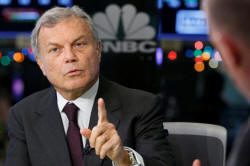WPP punished for slow response to advertising upheaval
 Send a link to a friend
Send a link to a friend
 [March 01, 2018]
By Kate Holton [March 01, 2018]
By Kate Holton
LONDON (Reuters) - Britain's WPP <WPP.L>
struggled to keep pace with changes in advertising in 2017, with its
worst annual sales performance since the financial crisis and a gloomy
outlook putting its shares on track for their worst day in 20 years.
The world's biggest advertising group has been hit by consumer goods
clients such as Unilever cutting spending and by Google, Facebook and
consultants Accenture encroaching on its turf, forcing it to cut its
outlook three times in 2017.
"2017 for us was not a pretty year," WPP's founder Martin Sorrell said,
adding it would accelerate a plan to simplify the group which employs
more than 200,000 people in 112 countries through agencies including JWT,
Ogilvy & Mather and Finsbury.
Shares in WPP dropped by 14 percent, putting it on track for its worst
day since 1998 and wiping 2.3 billion pounds off its market value.
Investors had expected it to echo peers Omnicom <OMC.N>, IPG <IPG.N> and
Publicis <PUBP.PA> in sounding more upbeat about 2018.

The world's leading advertising giants are rethinking their models after
growing through repeated acquisitions of agencies which are often run as
separate entities and designed to compete with each other to provide the
best service.
But with technology changing advertising and consumer goods groups
demanding cost savings, clients are increasingly wanting to work with
one team who can provide a common proposal for media planning, creative
ideas, data and analysis.
"Clients want things to be much more agile, simplified, better and
cheaper and that is what we have to respond to," Sorrell told Reuters.
"We have been going in that direction but we have to go faster."
A strategy it currently uses for its biggest clients such as Ford and
Colgate-Palmolive, where it creates a single team to provide all the
services required by that company rather than through multiple agencies,
could be rolled out more widely.
Publicis has set up "Chief client officers" but all the holding
companies struggle with the fact their staff are traditionally loyal to
the agencies such as Ogilvy & Mather, seen as the inspiration for the
Man Men TV series.
"We start this new phase of our journey from a position of market
leadership, and with total confidence in the enduring value of what we
offer our clients," Sorrell said.
CHANGING TIMES?
WPP reported a 0.9 percent drop in 2017 underlying net sales, after
predicting a broadly flat outcome in October, with demand particularly
weak in North America where net sales fell 3.2 percent. Britain was one
of the strongest performers.

[to top of second column] |

Sir Martin Sorrell, Chairman and Chief Executive Officer of
advertising company WPP, speaks during an interview with CNBC at the
New York Stock Exchange (NYSE) in New York, U.S., December 13, 2017.
REUTERS/Brendan McDermid

For 2018 it said the group's budgets were being set on the basis it would see
flat growth for revenue and net sales, with the headline operating margin also
flat in constant currency.
That looks particularly cautious when 2018 offers the soccer World Cup, the
Winter Olympics, mid-term U.S. elections and a generally more buoyant global
economy, factors that would normally boost its sales.
However net sales were down 1.2 percent in January, showing little sign of
improvement.
Looking ahead to its longer-term target, WPP also cut a forecast for annual
diluted earnings per share growth to 5 to 10 percent, from a previous forecast
of 10 to 15 percent.
WPP, which Sorrell built from a two-man operation in a London office in 1985 to
one with annual billings of 56 billion pounds ($77 billion), has been
particularly hurt by the pressures in the packaged goods sector.
Clients such as Unilever <ULVR.L>, Nestle <NESN.S> and Procter and Gamble <PG.N>
are cutting spending as consumers turn to more niche brands, hitting sales.
Unilever is also bringing certain capabilities in-house, such as creating its
own content through a new unit. Other clients have also started to make their
own content and place it directly on Facebook and Google.

Richard Hunter, head of Markets at Interactive Investor, said cost conscious
companies were taking a shorter-term view while there were red flags around the
North American region.
"The jury is still out as to whether WPP has suffered due to a cyclical change,
or whether the landscape is actually structurally different," he said.
"The general view of the shares as a buy has been in place for some time,
although this will come under increasing pressure in the absence of some rather
more positive prospects."
(Additional reporting by Gwénaëlle Barzic and Martinne Geller; Editing by Keith
Weir/David Evans/Alexander Smith)
[© 2018 Thomson Reuters. All rights
reserved.] Copyright 2018 Reuters. All rights reserved. This material may not be published,
broadcast, rewritten or redistributed.
Thompson Reuters is solely responsible for this content. |